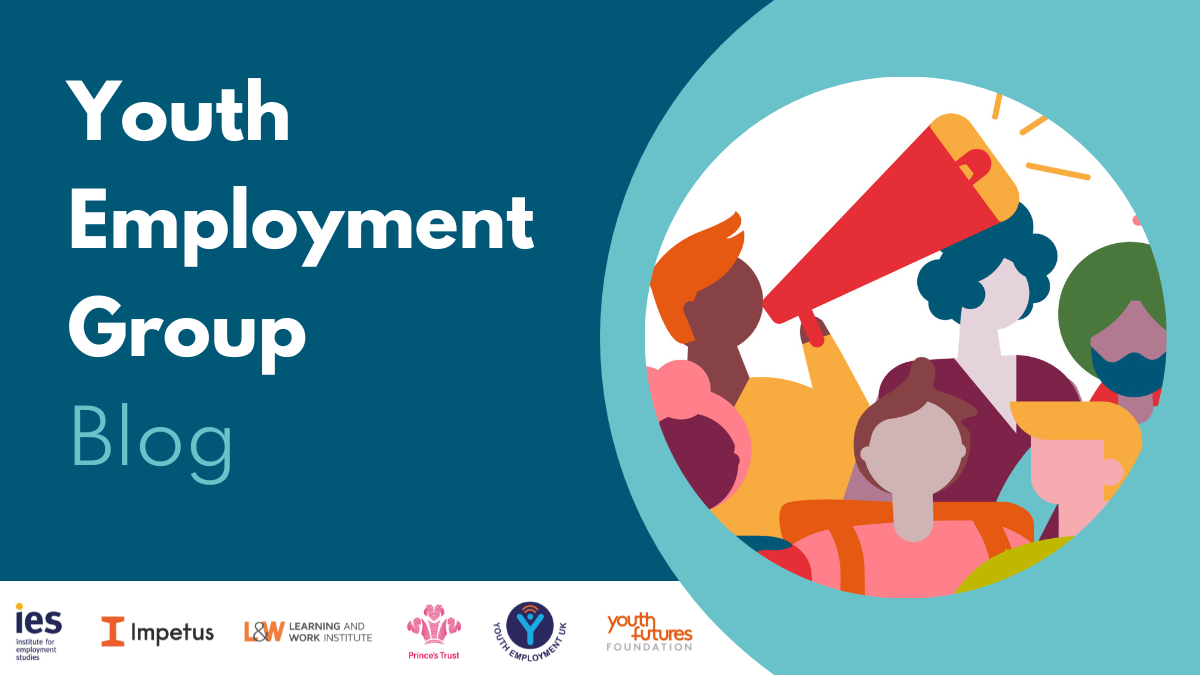
Why does the Youth Employment Group exist?
The Youth Employment Group (YEG) exists to ensure that there is a quality employment, education or training pathway for all young people, in particular the most marginalised.
What does the YEG do?
It brings together the UK’s largest coalition of youth employment experts and the latest evidence and insight, with young people who have faced or are facing barriers to employment. Together they:
- Set the agenda by raising the profile of labour market issues facing young people
- Provide tools with practical guidance on issues and how to tackle them
- Drive change in policy and activity by working with employers, local and national governments, civic society and young people.
How will this be achieved?
The YEG advocates for urgent action across the UK to:
- Tackle the systemic issues that mean hundreds of thousands of young people are left out of employment and education, permanently damaging their long-term health and wealth
- Protect young people during periods of economic uncertainty and labour market decline
- Improve the quality and accessibility of support for all young people so that they can secure and progress in employment, education and training.
How are young people involved?
We are committed to embedding the views and experiences of young people and the challenges they are facing through the Youth Voice Forum, chaired by young people. It meets monthly on a range of topics, providing a space for them to engage in the YEG and share their experiences, challenges, ideas and solutions.
What do the YEG subgroups focus on?
Through a partnership with the Westminster Foundation, the YEG supports subgroups that focus on the causes and solutions of issues facing different groups of young people, and the support they need. These subgroups focus on:
- Disability
- Youth justice
- Apprenticeships
- Self-employment
- Employers
- Quality of work
- Ethnic disparities
Ethnic Disparities Subgroup
The Youth Employment Group (YEG) launched the Ethnic Disparities Subgroup in July 2021 to zoom in on specific barriers young people face accessing employment. The Ethnic Disparities Subgroup is co-chaired by Youth Futures Foundation and the Council for Somali Organisations and was set up to zero in on the employment disparities young people from ethnic minority backgrounds face and to bring together experts from the YEG to explore specifically how we can support more young people from ethnic minority backgrounds into high quality employment, education or training. The subgroup meets every 6-8 weeks and, in 2021-2022, Youth Futures has commissioned three strands of research in collaboration with the Learning & Work Institute and Savanta ComRes. The projects include a rapid evidence review of policies affecting young people from ethnic minority backgrounds over the last 10-15 years, a data analysis project looking into ethnicity data gaps, and a nationally representative youth voice survey of over 2,500 young people from ethnic minority backgrounds on their experiences, outlook and attitudes in the context of work.
“As Co-Chair of the YEG Ethnic Disparities subgroup, I want to uncover what influences the employment prospects of young people from minoritised ethnic backgrounds. Currently, we are identifying how evidence is informing policy and practice in this area, as well as pinpointing gaps in knowledge. Our aim is to support more young people into high-quality education, training or employment by developing evidence-based recommendations.”
Kahiye Alim, Director, Council of Somali Organisations
How do I join?
If your organisation would like to join the Youth Employment Group to share your practices, insights and/or research, please complete our member enquiry form.
If you are an organisation or employer that would like to join the YEG’s Ethnic Disparities Subgroup, please get in touch by emailing [email protected]
Latest activity:
- January 2023: Research from the IFS found that the generation who entered the labour market during the pandemic have largely bucked the trend of previous recessions, where those individuals suffer lasting damage to their prospects.
- November 2022: The YEG Ethnic Disparities sub-group is launched at the House of Lords. The results of a survey of 2,200 ethnic minority young people are released. Minister Mims Davies announces her new role as Parliamentary Under Secretary of State for Social Mobility, Youth and Progression following YEG calls for greater cross-government accountability and collaboration to tackle youth unemployment| https://youthfuturesfoundation.org/news/launch-of-ethnic-disparities-research-at-landmark-event/
- July 2022: The Ethnic Disparities sub-group commissioned Savanta ComRes to carry out a rapid youth voice survey of young people from ethnic minority backgrounds experiences of navigating the labour market.
- March 2022: The Ethnic Disparities sub-group commissioned the Learning & Work Institute to carry out a data analysis project looking at gaps in the data for young minority ethnic groups.
- November 2021: Following YEG calls to evaluate Kickstart, the National Audit Office publishes its report | https://www.nao.org.uk/wp-content/uploads/2021/11/Employment-support-the-Kickstart-Scheme.pdf
- November 2021: The YEG’s recommendations are largely adopted in the House of Lords Youth Unemployment Committee’s Skills for Every Young Person report | https://committees.parliament.uk/publications/7988/documents/82440/default/
- August 2021: The YEG called on the Prime Minister to deliver an Opportunity Guarantee for young people | Call covered in The Mirror
- July 2021: The YEG launched a new paper at the APPG for Youth Employment providing a framework for the Government to deliver on its Opportunity Guarantee | “Levelling Up for Young People: Building an Opportunity Guarantee” (pdf, 2mb)
- October 2021: In response to the YEG’s call, The Chancellor extends Kickstart by six months |Covered by the BBC
- January and February 2021: The YEG calls for an extension to Kickstart, the government’s flagship youth employment Covid-19 programme, publishing a paper on the Five reasons to extend ‘Kickstart’ | Call covered by The Independent
- September 2020: The YEG launched a recommendations paper | Securing a place for young people in the nation’s economic recovery
- July 2020: The Chancellor announces Kickstart in response to the YEG’s calls for urgent support for young people facing a youth unemployment crisis | Covered by the BBC
- June 2020: Following the YEG’s letter to The Times, the Prime Minister commits to an Opportunity Guarantee ensuring youth employment is at the heart of the government’s plan for jobs, including Kickstart, apprenticeship wage subsidies and Youth Hubs | Speech covered in The TES
- June 2020: The YEG calls for an Opportunity Guarantee to address the urgent need for opportunities for people to skill up, get a job and have a role in our recovery | Call published in The Times
- April 2020: The Youth Employment Group is launched in response to the youth unemployment crisis caused by the pandemic| Covered by The Independent
- December 2019: Several youth employment organisations convene at The Prince’s Trust to discuss what realistic targets could we set governments to reduce youth unemployment, with the aim of developing a consensus position.

YEG co-chairs discuss recently launched Young Person’s Guarantee
At the recent Youth Employment Group (YEG) meeting, co-chairs and members provided key updates from across the youth employment sector.
Co-chairs discussed the recently launched Young Person’s Guarantee (YPG) paper, which was included in the Autumn statement submission and was showcased at the Conservative Party and Labour Party conferences. These events were joined respectively by Mims Davies MP, Minister for Social Mobility, Youth and Progression and Alison McGovern, Shadow Minister for Work and Pensions who showed their recognition and support for many of the recommendations embedded in the paper.
Latest labour market stats – Tony Wilson (Director, Institute for Employment Studies)
In his update on the latest labour market statistics, Tony noted how Young people leaving full time education and are struggling to find jobs. (This update referred to the ONS labour market statistics released on 12 September 2023)
- Economic inactivity increased to 1.6 million, which is the highest increase it has seen since covid-19.
- To find out more: read IES briefing on September labour market statistics here; read L&W’s briefing here.
Update on recent Disability Subgroup work and consultation submissions – Martin McLean (NDCS), Laura Bates (BASE)
Martin and Laura shared the response from the YEG disability subgroup to the House of Lords Inquiry into transitions from education to employment for young disabled people. Key points made to the inquiry include:
- The majority of young people with SEND do not have EHCP and may therefore miss out on transition planning, even for those with EHCP’s there is little accountability on the quality of transition planning that takes place
- Work experience is an important part in making a successful transition however disabled people can face barriers in finding accessible placements
- Supported internships provide excellent pathway into employment, yet many young disabled people are not eligible.
Update on the Good Jobs Project – Harry Brown (ReGenerate)
Harry presented on the Good Jobs Project, a paper focusing on purpose-driven recruitment with the ambition to help close vacancy gaps, which remain high, as well as finding solutions that support businesses, social mobility and society. Key elements include:
- 70% of employers felt that most marginalised groups would fit well in their organisation. Close to 20% were raking action to recruit from most groups.
- Issues identified included pre existing perceptions, existing policies, the business case, lack of knowledge of where to start, lack of advice, lack of partnership opportunities, fear of risk to reputation and fear of getting it wrong
- Asked what would encourage them to take action – financial grants, advice, financial incentives benefits, expert platforms etc
- Find the report here.
